Abstract
Transforming growth factor-alpha (TGF-alpha) expression is associated with hepatocyte DNA replication both in vivo and in culture. Our previous work using TGF-alpha transgenic mice showed that constitutive overexpression of this growth factor in the liver causes hepatic tumors in 75 to 80% of the animals at 12 to 15 months of age. To understand the cellular events by which TGF-alpha overexpression leads to abnormal liver growth, we examined hepatocyte proliferative activity in young and old TGF-alpha transgenic mice and hepatocyte ploidy in normal, dysplastic, and neoplastic livers of these animals. At 4 weeks of age, transgenic mice had higher liver weights and liver weight/body weight ratios than non-transgenic mice of the same age and hepatocyte proliferative activity, measured by 3H-thymidine incorporation after 3- and 7-day infusion, proliferating cell nuclear antigen staining, and mitotic index determination, was 2 to 3 times higher than in controls. In both transgenic and non-transgenic mice hepatocyte proliferation declined with age but the decrease was much more pronounced in control animals, so that at 8 months of age, hepatocyte replication was 8 to 10 times higher in transgenic animals. Surprisingly, however, transgenic and non-transgenic mice at this age had similar liver weight/body weight ratios. Labeling studies done in 3-month-old animals revealed that hepatocyte turnover was much faster in transgenic than in control animals, suggesting that a homeostatic compensatory mechanism involving cell death tended to restore normal liver weight/body weight ratios in older transgenic mice. Ploidy analyses showed that at 4 weeks of age transgenic mice had a higher proportion of diploid and tetraploid hepatocytes and that the hepatocellular tumors which developed in TGF-alpha transgenic mice at 13 months of age contained a higher fraction of diploid hepatocytes than that present in adjacent tissue or in dysplastic livers. The results demonstrate that constitutive overexpression of TGF-alpha causes increased hepatocyte proliferation and liver enlargement in young animals and is associated with a delay in the establishment of hepatic polyploidy. These findings as well as the response of transgenic mice to partial hepatectomy show that constitutive overexpression of TGF-alpha initially caused increased but regulated hepatocyte proliferation which in older animals was compensated in part by a faster cell turnover. At 8 to 10 months of age, proliferative activity may become constitutive in some TGF-alpha expressing hepatocytes.(ABSTRACT TRUNCATED AT 400 WORDS)
Full text
PDF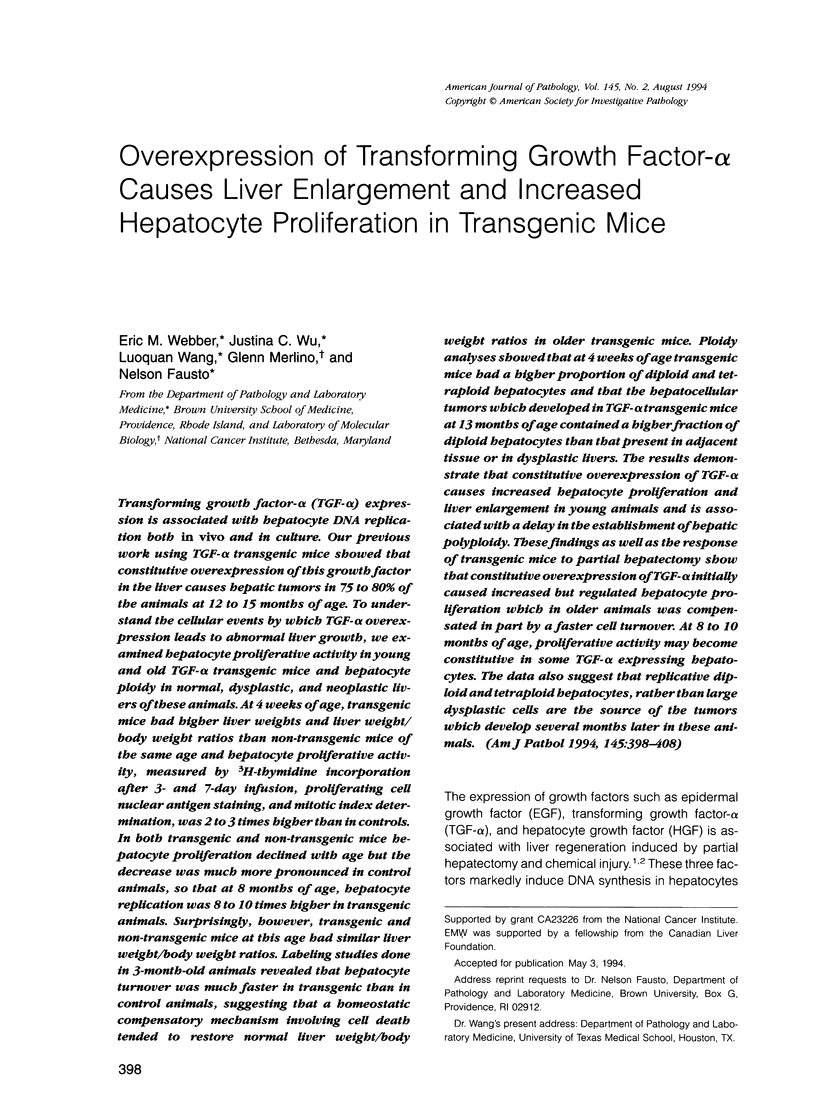
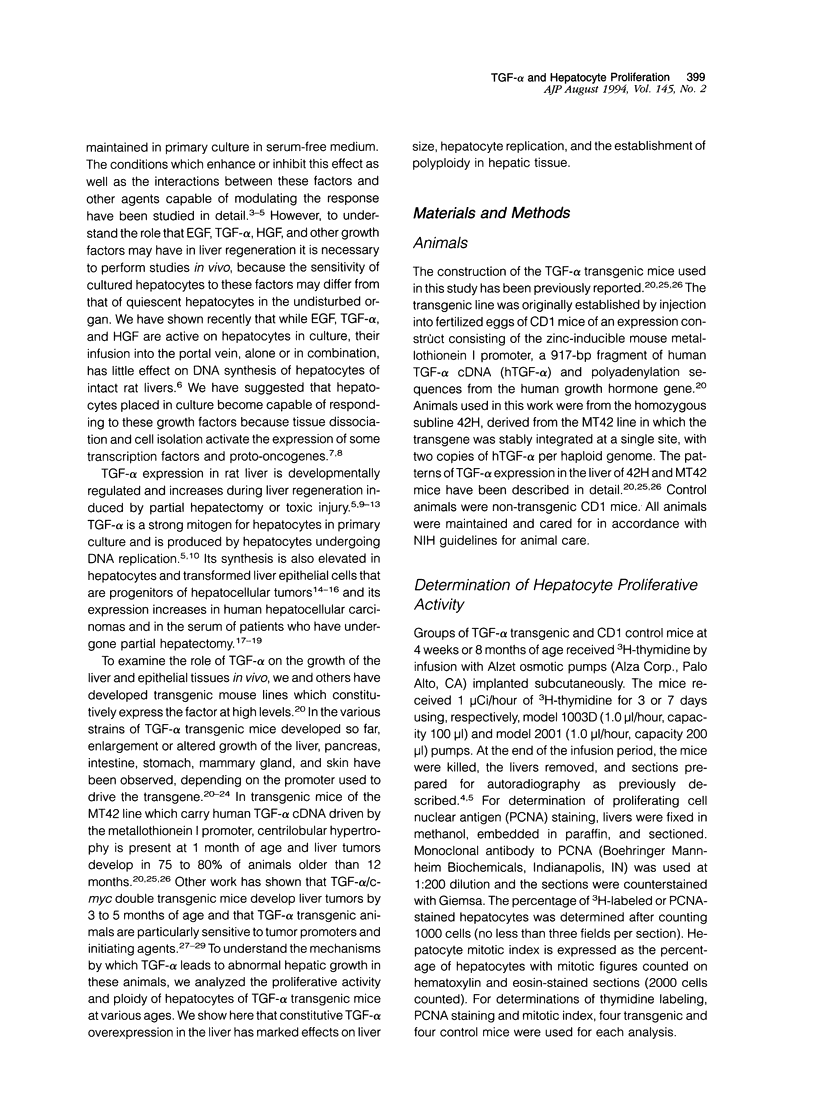
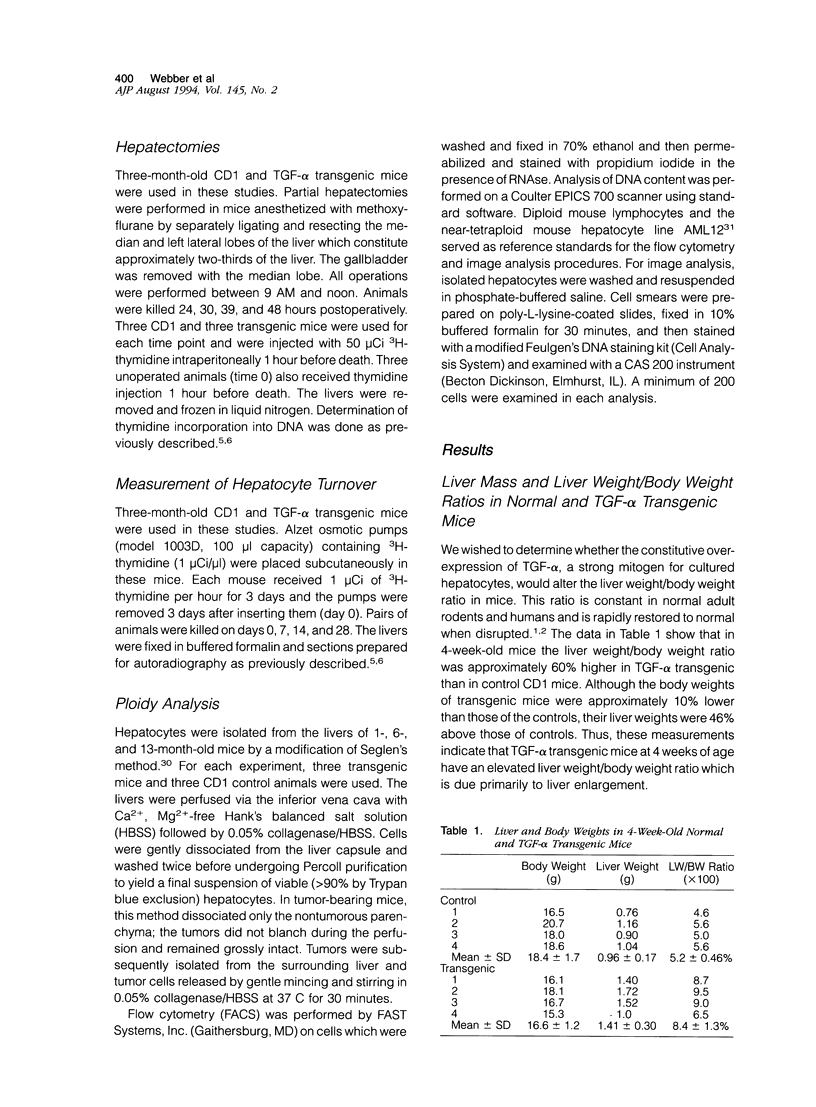
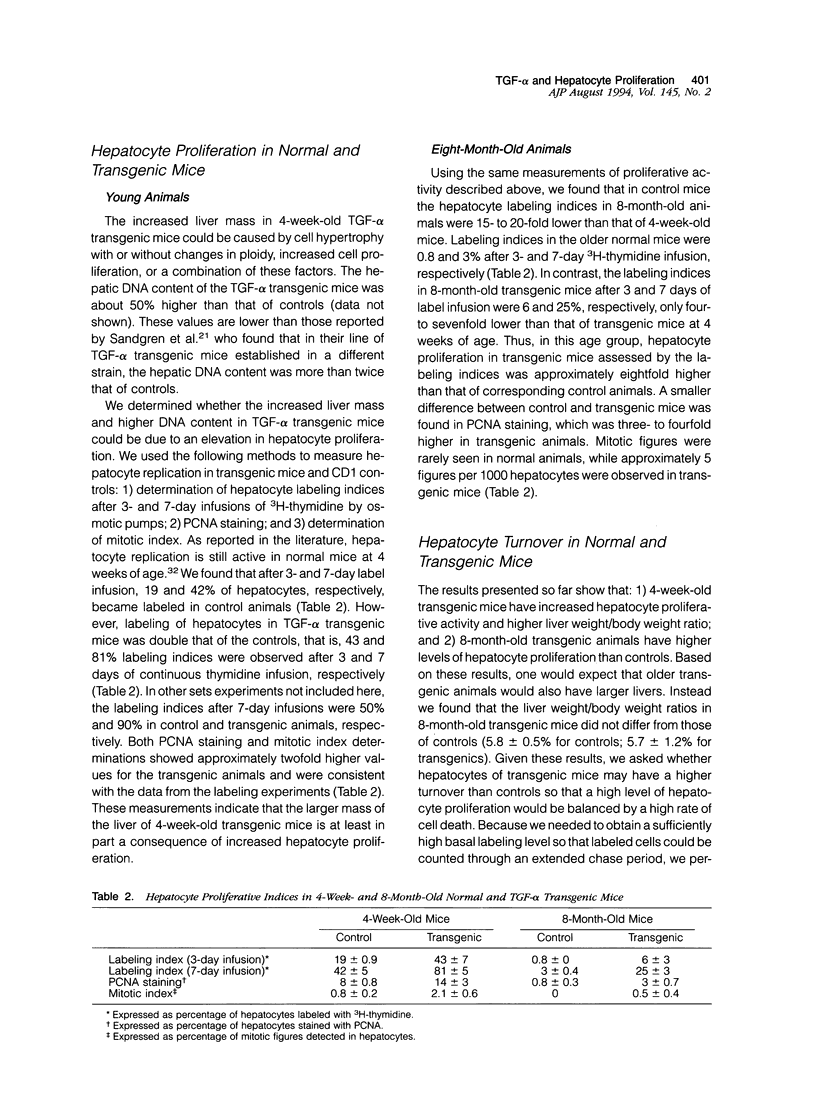
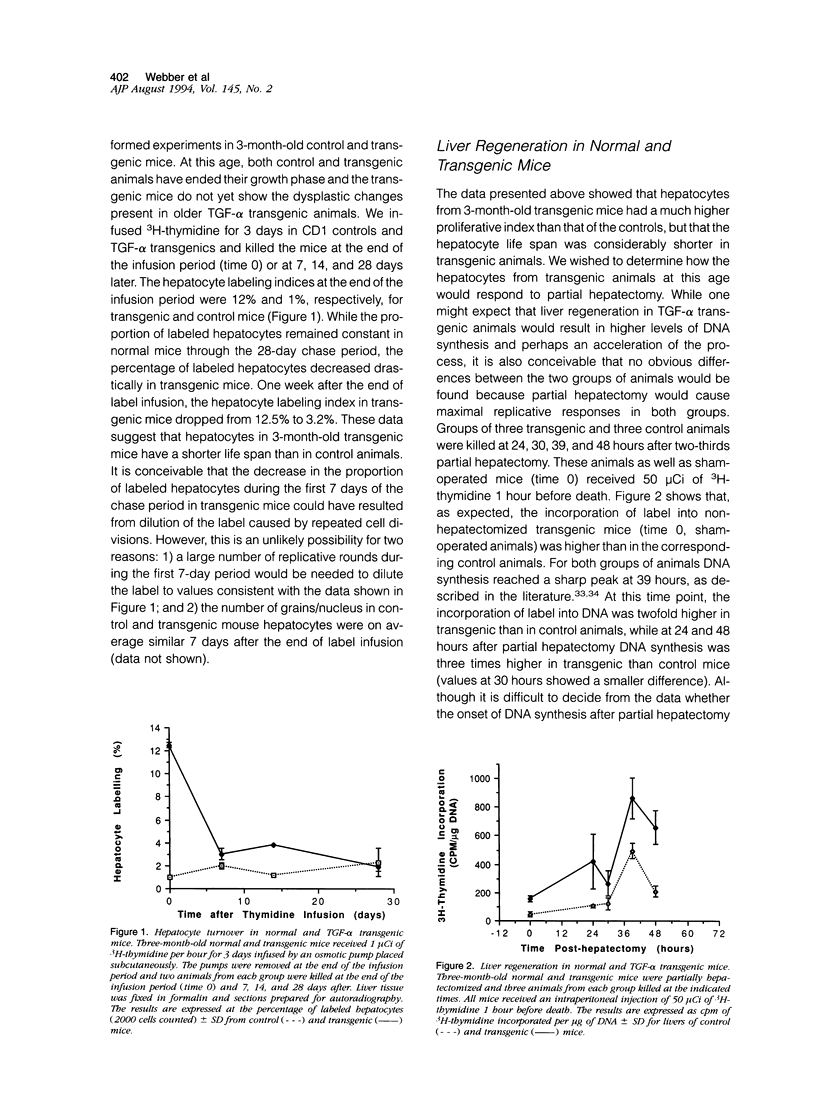
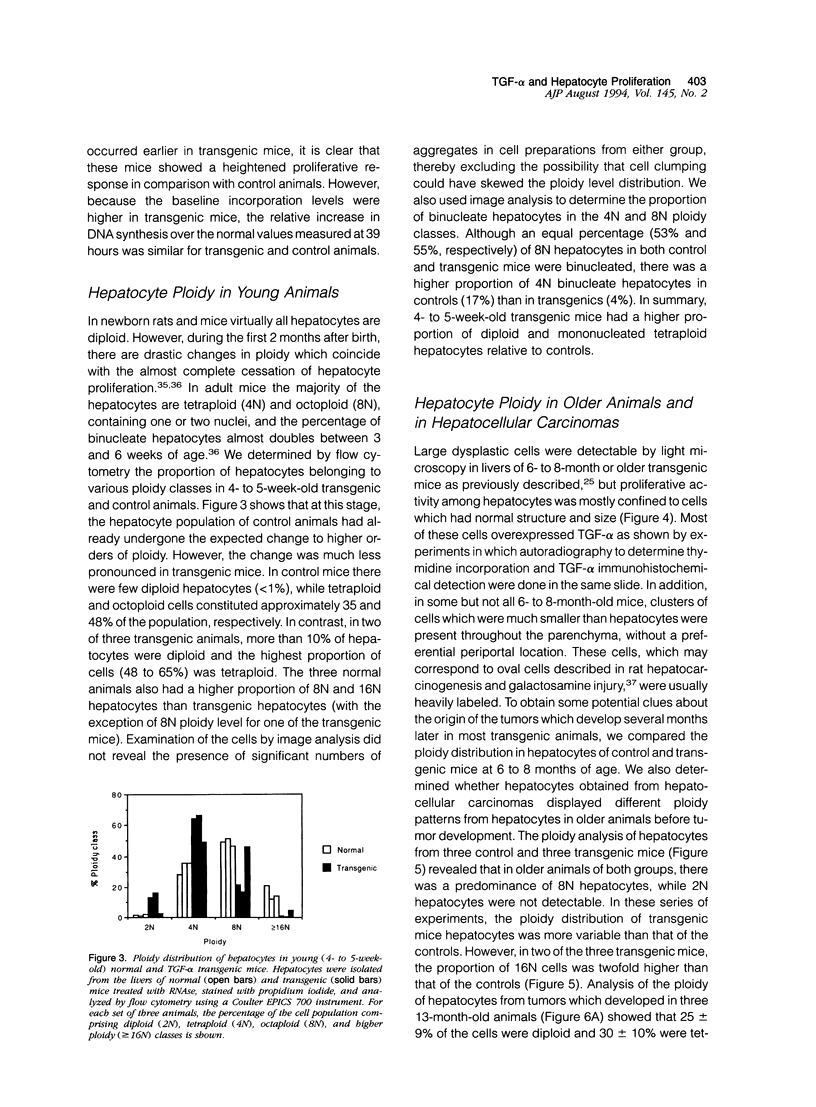
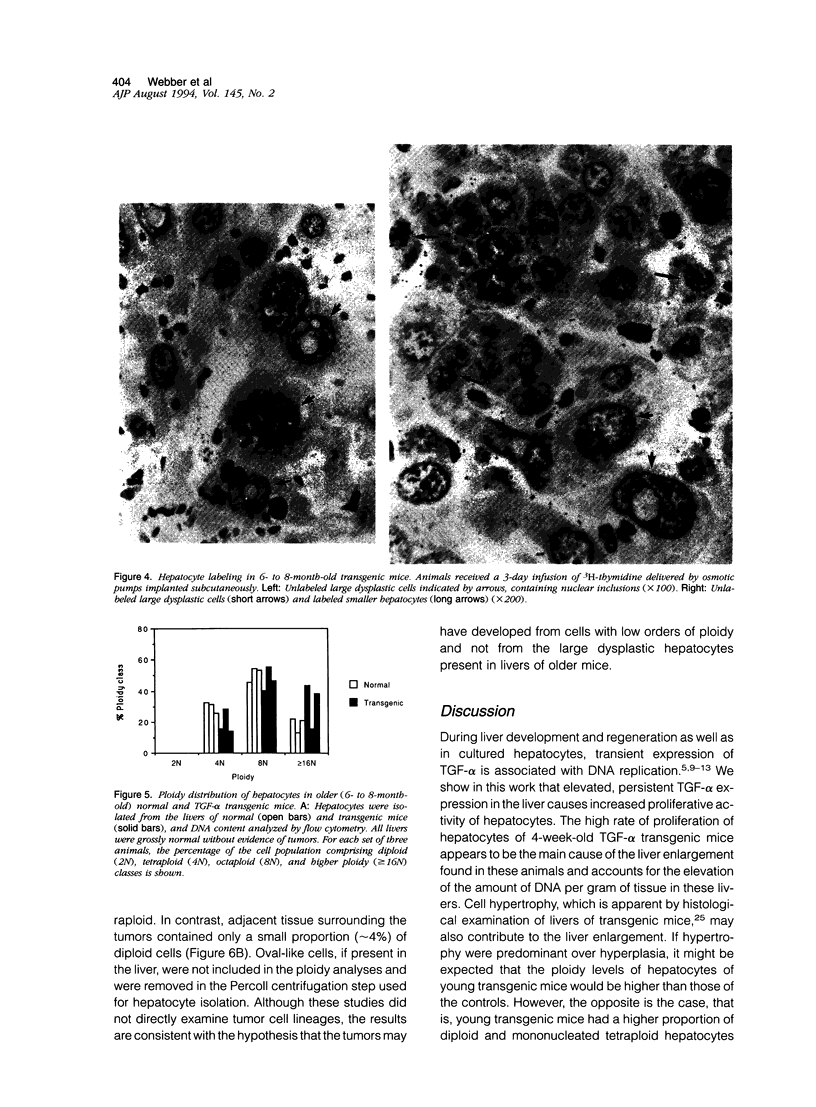
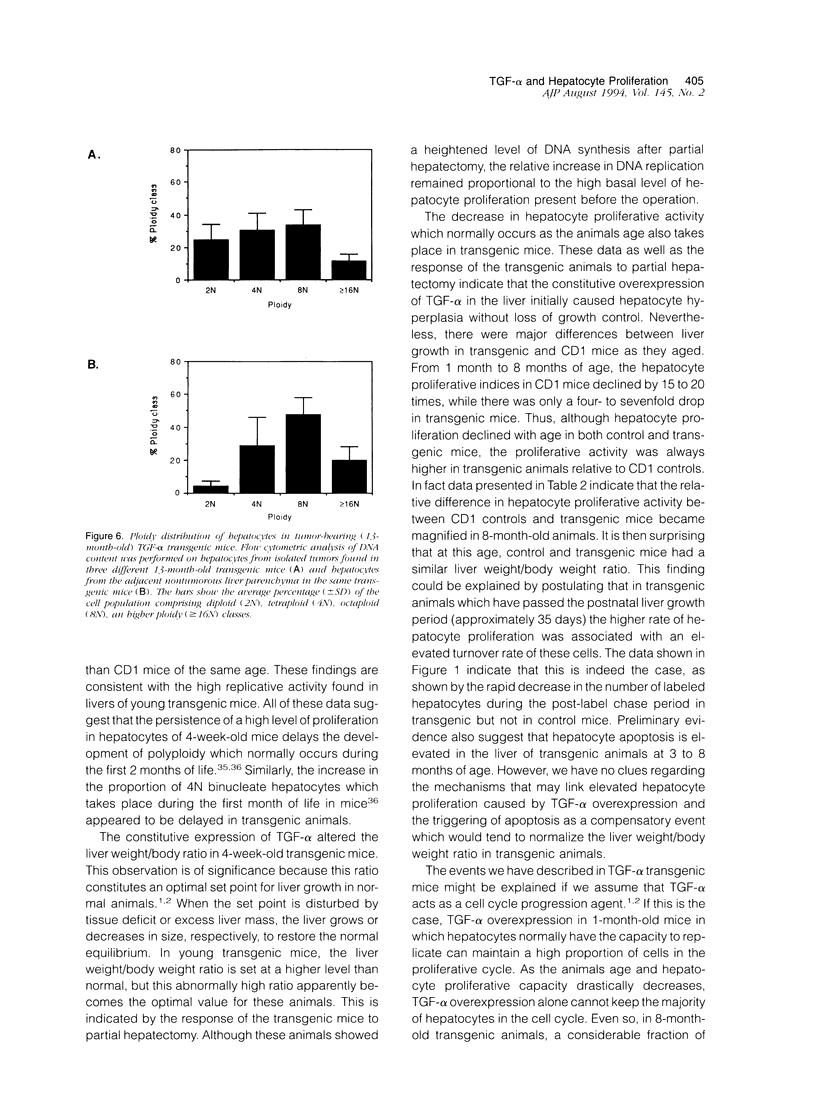
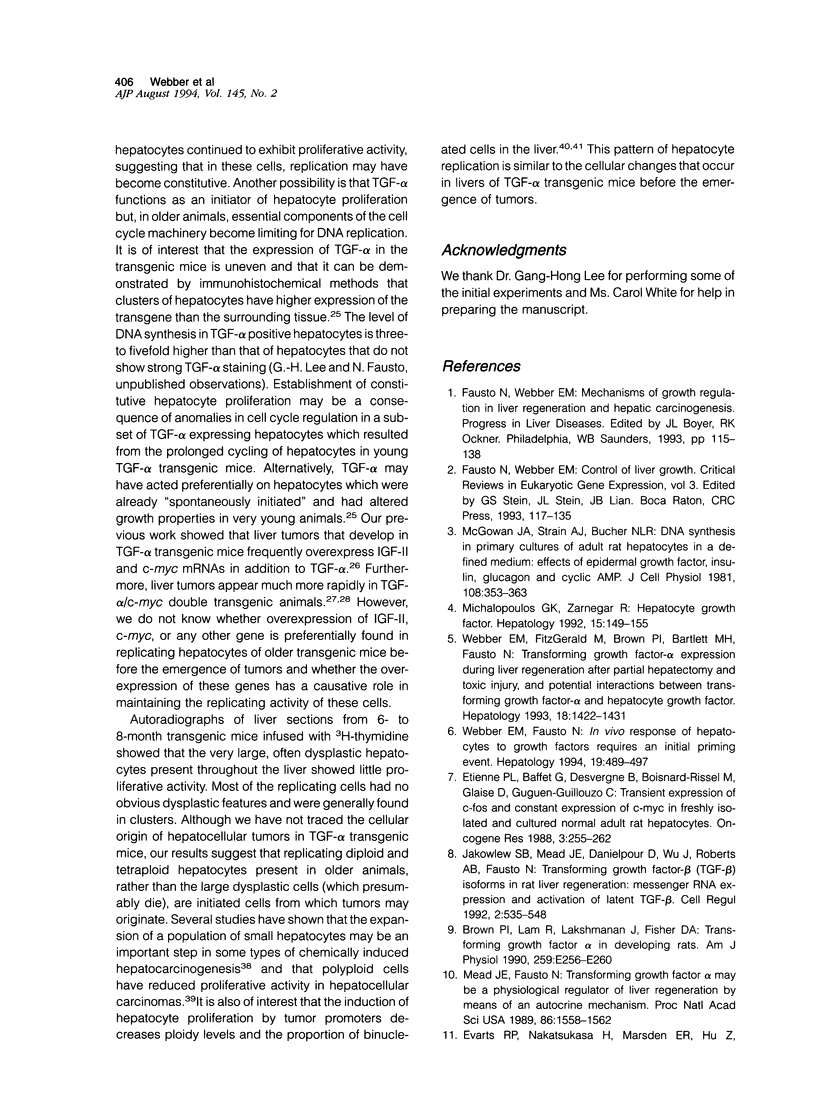
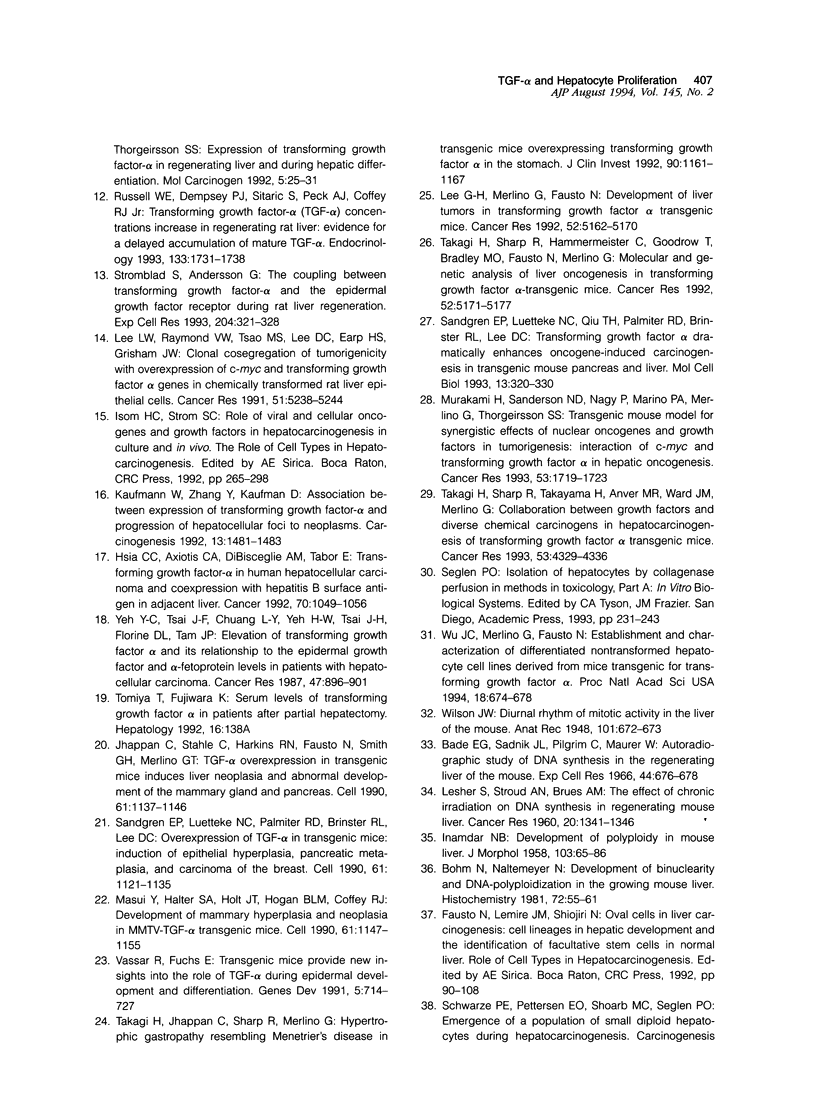

Images in this article
Selected References
These references are in PubMed. This may not be the complete list of references from this article.
- Bade E. G., Sadnik I. L., Pilgrim C., Maurer W. Autoradiographic study of DNA-synthesis in the regenerating liver of the mouse. Exp Cell Res. 1966 Nov-Dec;44(2):676–678. doi: 10.1016/0014-4827(66)90484-8. [DOI] [PubMed] [Google Scholar]
- Brown P. I., Lam R., Lakshmanan J., Fisher D. A. Transforming growth factor alpha in developing rats. Am J Physiol. 1990 Aug;259(2 Pt 1):E256–E260. doi: 10.1152/ajpendo.1990.259.2.E256. [DOI] [PubMed] [Google Scholar]
- Böhm N., Noltemeyer N. Development of binuclearity and DNA-polyploidization in the growing mouse liver. Histochemistry. 1981;72(1):55–61. doi: 10.1007/BF00496779. [DOI] [PubMed] [Google Scholar]
- Etienne P. L., Baffet G., Desvergne B., Boisnard-Rissel M., Glaise D., Guguen-Guillouzo C. Transient expression of c-fos and constant expression of c-myc in freshly isolated and cultured normal adult rat hepatocytes. Oncogene Res. 1988;3(3):255–262. [PubMed] [Google Scholar]
- Evarts R. P., Nakatsukasa H., Marsden E. R., Hu Z., Thorgeirsson S. S. Expression of transforming growth factor-alpha in regenerating liver and during hepatic differentiation. Mol Carcinog. 1992;5(1):25–31. doi: 10.1002/mc.2940050107. [DOI] [PubMed] [Google Scholar]
- Fausto N., Webber E. M. Control of liver growth. Crit Rev Eukaryot Gene Expr. 1993;3(2):117–135. [PubMed] [Google Scholar]
- Fausto N., Webber E. M. Mechanisms of growth regulation in liver regeneration and hepatic carcinogenesis. Prog Liver Dis. 1993;11:115–137. [PubMed] [Google Scholar]
- Gerlyng P., Grotmol T., Erikstein B., Stokke T., Seglen P. O. Reduced proliferative activity of polyploid cells in primary hepatocellular carcinoma. Carcinogenesis. 1992 Oct;13(10):1795–1801. doi: 10.1093/carcin/13.10.1795. [DOI] [PubMed] [Google Scholar]
- Gerlyng P., Grotmol T., Seglen P. O. Effect of 4-acetylaminofluorene and other tumour promoters on hepatocellular growth and binucleation. Carcinogenesis. 1994 Feb;15(2):371–379. doi: 10.1093/carcin/15.2.371. [DOI] [PubMed] [Google Scholar]
- Hsia C. C., Axiotis C. A., Di Bisceglie A. M., Tabor E. Transforming growth factor-alpha in human hepatocellular carcinoma and coexpression with hepatitis B surface antigen in adjacent liver. Cancer. 1992 Sep 1;70(5):1049–1056. doi: 10.1002/1097-0142(19920901)70:5<1049::aid-cncr2820700507>3.0.co;2-c. [DOI] [PubMed] [Google Scholar]
- Jakowlew S. B., Mead J. E., Danielpour D., Wu J., Roberts A. B., Fausto N. Transforming growth factor-beta (TGF-beta) isoforms in rat liver regeneration: messenger RNA expression and activation of latent TGF-beta. Cell Regul. 1991 Jul;2(7):535–548. doi: 10.1091/mbc.2.7.535. [DOI] [PMC free article] [PubMed] [Google Scholar]
- Jhappan C., Stahle C., Harkins R. N., Fausto N., Smith G. H., Merlino G. T. TGF alpha overexpression in transgenic mice induces liver neoplasia and abnormal development of the mammary gland and pancreas. Cell. 1990 Jun 15;61(6):1137–1146. doi: 10.1016/0092-8674(90)90076-q. [DOI] [PubMed] [Google Scholar]
- Kaufmann W. K., Zhang Y., Kaufman D. G. Association between expression of transforming growth factor-alpha and progression of hepatocellular foci to neoplasms. Carcinogenesis. 1992 Aug;13(8):1481–1483. doi: 10.1093/carcin/13.8.1481. [DOI] [PubMed] [Google Scholar]
- LESHER S., STROUD A. N., BRUES A. M. The effects of chronic irradiation on DNA synthesis in regenerating mouse liver. Cancer Res. 1960 Oct;20:1341–1346. [PubMed] [Google Scholar]
- Lee G. H., Merlino G., Fausto N. Development of liver tumors in transforming growth factor alpha transgenic mice. Cancer Res. 1992 Oct 1;52(19):5162–5170. [PubMed] [Google Scholar]
- Lee L. W., Raymond V. W., Tsao M. S., Lee D. C., Earp H. S., Grisham J. W. Clonal cosegregation of tumorigenicity with overexpression of c-myc and transforming growth factor alpha genes in chemically transformed rat liver epithelial cells. Cancer Res. 1991 Oct 1;51(19):5238–5244. [PubMed] [Google Scholar]
- Matsui Y., Halter S. A., Holt J. T., Hogan B. L., Coffey R. J. Development of mammary hyperplasia and neoplasia in MMTV-TGF alpha transgenic mice. Cell. 1990 Jun 15;61(6):1147–1155. doi: 10.1016/0092-8674(90)90077-r. [DOI] [PubMed] [Google Scholar]
- McGowan J. A., Strain A. J., Bucher N. L. DNA synthesis in primary cultures of adult rat hepatocytes in a defined medium: effects of epidermal growth factor, insulin, glucagon, and cyclic-AMP. J Cell Physiol. 1981 Sep;108(3):353–363. doi: 10.1002/jcp.1041080309. [DOI] [PubMed] [Google Scholar]
- Mead J. E., Fausto N. Transforming growth factor alpha may be a physiological regulator of liver regeneration by means of an autocrine mechanism. Proc Natl Acad Sci U S A. 1989 Mar;86(5):1558–1562. doi: 10.1073/pnas.86.5.1558. [DOI] [PMC free article] [PubMed] [Google Scholar]
- Michalopoulos G. K., Zarnegav R. Hepatocyte growth factor. Hepatology. 1992 Jan;15(1):149–155. doi: 10.1002/hep.1840150125. [DOI] [PubMed] [Google Scholar]
- Murakami H., Sanderson N. D., Nagy P., Marino P. A., Merlino G., Thorgeirsson S. S. Transgenic mouse model for synergistic effects of nuclear oncogenes and growth factors in tumorigenesis: interaction of c-myc and transforming growth factor alpha in hepatic oncogenesis. Cancer Res. 1993 Apr 15;53(8):1719–1723. [PubMed] [Google Scholar]
- Russell W. E., Dempsey P. J., Sitaric S., Peck A. J., Coffey R. J., Jr Transforming growth factor-alpha (TGF alpha) concentrations increase in regenerating rat liver: evidence for a delayed accumulation of mature TGF alpha. Endocrinology. 1993 Oct;133(4):1731–1738. doi: 10.1210/endo.133.4.8404616. [DOI] [PubMed] [Google Scholar]
- Sandgren E. P., Luetteke N. C., Palmiter R. D., Brinster R. L., Lee D. C. Overexpression of TGF alpha in transgenic mice: induction of epithelial hyperplasia, pancreatic metaplasia, and carcinoma of the breast. Cell. 1990 Jun 15;61(6):1121–1135. doi: 10.1016/0092-8674(90)90075-p. [DOI] [PubMed] [Google Scholar]
- Sandgren E. P., Luetteke N. C., Qiu T. H., Palmiter R. D., Brinster R. L., Lee D. C. Transforming growth factor alpha dramatically enhances oncogene-induced carcinogenesis in transgenic mouse pancreas and liver. Mol Cell Biol. 1993 Jan;13(1):320–330. doi: 10.1128/mcb.13.1.320. [DOI] [PMC free article] [PubMed] [Google Scholar]
- Strömblad S., Andersson G. The coupling between transforming growth factor-alpha and the epidermal growth factor receptor during rat liver regeneration. Exp Cell Res. 1993 Feb;204(2):321–328. doi: 10.1006/excr.1993.1039. [DOI] [PubMed] [Google Scholar]
- Takagi H., Jhappan C., Sharp R., Merlino G. Hypertrophic gastropathy resembling Ménétrier's disease in transgenic mice overexpressing transforming growth factor alpha in the stomach. J Clin Invest. 1992 Sep;90(3):1161–1167. doi: 10.1172/JCI115936. [DOI] [PMC free article] [PubMed] [Google Scholar]
- Takagi H., Sharp R., Hammermeister C., Goodrow T., Bradley M. O., Fausto N., Merlino G. Molecular and genetic analysis of liver oncogenesis in transforming growth factor alpha transgenic mice. Cancer Res. 1992 Oct 1;52(19):5171–5177. [PubMed] [Google Scholar]
- Takagi H., Sharp R., Takayama H., Anver M. R., Ward J. M., Merlino G. Collaboration between growth factors and diverse chemical carcinogens in hepatocarcinogenesis of transforming growth factor alpha transgenic mice. Cancer Res. 1993 Sep 15;53(18):4329–4336. [PubMed] [Google Scholar]
- Vassar R., Fuchs E. Transgenic mice provide new insights into the role of TGF-alpha during epidermal development and differentiation. Genes Dev. 1991 May;5(5):714–727. doi: 10.1101/gad.5.5.714. [DOI] [PubMed] [Google Scholar]
- Webber E. M., FitzGerald M. J., Brown P. I., Bartlett M. H., Fausto N. Transforming growth factor-alpha expression during liver regeneration after partial hepatectomy and toxic injury, and potential interactions between transforming growth factor-alpha and hepatocyte growth factor. Hepatology. 1993 Dec;18(6):1422–1431. [PubMed] [Google Scholar]
- Webber E. M., Godowski P. J., Fausto N. In vivo response of hepatocytes to growth factors requires an initial priming stimulus. Hepatology. 1994 Feb;19(2):489–497. [PubMed] [Google Scholar]
- Wu J. C., Merlino G., Fausto N. Establishment and characterization of differentiated, nontransformed hepatocyte cell lines derived from mice transgenic for transforming growth factor alpha. Proc Natl Acad Sci U S A. 1994 Jan 18;91(2):674–678. doi: 10.1073/pnas.91.2.674. [DOI] [PMC free article] [PubMed] [Google Scholar]
- Yeh Y. C., Tsai J. F., Chuang L. Y., Yeh H. W., Tsai J. H., Florine D. L., Tam J. P. Elevation of transforming growth factor alpha and its relationship to the epidermal growth factor and alpha-fetoprotein levels in patients with hepatocellular carcinoma. Cancer Res. 1987 Feb 1;47(3):896–901. [PubMed] [Google Scholar]



